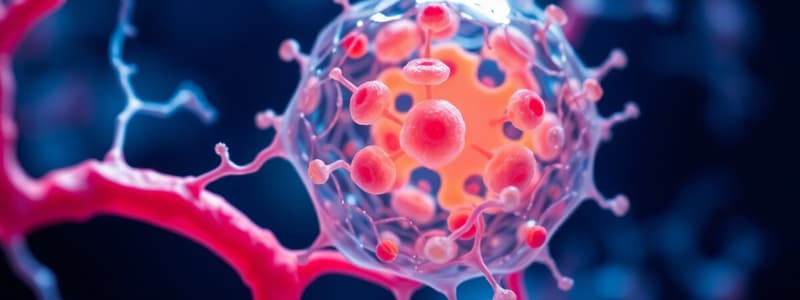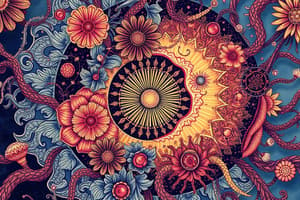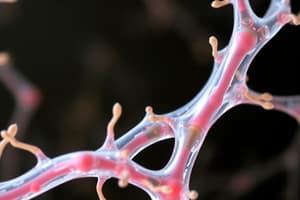Podcast
Questions and Answers
What is the primary function of mitochondria within a cell?
What is the primary function of mitochondria within a cell?
- Protein synthesis
- Energy production (correct)
- Regulating the passage of substances
- Processing and packaging molecules
Which of the following is NOT a key life process?
Which of the following is NOT a key life process?
- Photosynthesis (correct)
- Metabolism
- Reproduction
- Homeostasis
Cell division is an example of a life process related to growth.
Cell division is an example of a life process related to growth.
True (A)
The regulation of a stable internal environment in an organism is known as ______.
The regulation of a stable internal environment in an organism is known as ______.
What role does the cell membrane play in the life of a cell?
What role does the cell membrane play in the life of a cell?
Which of the following is NOT a key component of metabolism?
Which of the following is NOT a key component of metabolism?
What are two examples of how life processes are interconnected?
What are two examples of how life processes are interconnected?
The term 'biodiversity' refers to the variety of living organisms within a single species.
The term 'biodiversity' refers to the variety of living organisms within a single species.
How does energy flow through a living system?
How does energy flow through a living system?
Flashcards
Biology definition
Biology definition
The scientific study of life, its processes, and the organisms that embody life.
Cell
Cell
Basic unit of life, with complex organization, including organelles.
Cell biology
Cell biology
Study of cells, their structure, function and behavior.
Organelles
Organelles
Signup and view all the flashcards
Mitochondria
Mitochondria
Signup and view all the flashcards
Endoplasmic Reticulum
Endoplasmic Reticulum
Signup and view all the flashcards
Golgi apparatus
Golgi apparatus
Signup and view all the flashcards
Cell membrane
Cell membrane
Signup and view all the flashcards
Metabolism
Metabolism
Signup and view all the flashcards
Reproduction
Reproduction
Signup and view all the flashcards
Growth
Growth
Signup and view all the flashcards
Response to stimuli
Response to stimuli
Signup and view all the flashcards
Homeostasis
Homeostasis
Signup and view all the flashcards
Evolution
Evolution
Signup and view all the flashcards
Energy flow
Energy flow
Signup and view all the flashcards
Ecosystem
Ecosystem
Signup and view all the flashcards
Biodiversity
Biodiversity
Signup and view all the flashcards
Life Processes
Life Processes
Signup and view all the flashcards
Fundamental Unit of Life
Fundamental Unit of Life
Signup and view all the flashcards
Organism
Organism
Signup and view all the flashcards
Basic Biology
Basic Biology
Signup and view all the flashcards
Cell Function
Cell Function
Signup and view all the flashcards
Cellular Organization
Cellular Organization
Signup and view all the flashcards
Biomolecules
Biomolecules
Signup and view all the flashcards
Energy Production
Energy Production
Signup and view all the flashcards
Life
Life
Signup and view all the flashcards
Study Notes
Introduction to Biology
- Biology is the scientific study of life, encompassing a vast range of disciplines.
- It examines the structure, function, growth, origin, evolution, and distribution of living organisms.
- Key aspects include cellular processes, interactions between organisms, and the evolution of life on Earth.
Cell Biology
- Cell biology focuses on the structure, function, and behavior of cells.
- Cells are the fundamental units of life, exhibiting remarkable complexity and organization.
- Fundamental processes within cells include metabolism, reproduction (cell division), and communication.
- Various cell types, with specialized functions, make up complex organisms.
- Cells possess organelles, each with distinct roles within the cell's activities.
- Important organelles include mitochondria (energy production), endoplasmic reticulum (protein synthesis), and Golgi apparatus (processing and packaging of molecules).
- The cell membrane regulates the passage of substances into and out of the cell.
Life Processes
- Life processes are the fundamental activities required for organisms to survive and reproduce.
- Key life processes include:
- Metabolism: chemical reactions within the organism to obtain energy and build molecules.
- Reproduction: producing offspring, enabling the continuation of the species.
- Growth: increase in size and complexity of an organism.
- Response to stimuli: reacting to changes in the environment.
- Homeostasis: maintaining a stable internal environment.
- Evolution: inheritance of traits across generations, leading to adaptation to changed environments.
- These processes are orchestrated by complex interactions within and between cells, governed by specific biological mechanisms.
- Energy flow is crucial in all life. Food provides the initial source of energy, fueling the life processes and maintaining the organization of living systems.
- Energy is utilized for growth, development, and other life processes.
- Interactions between organisms are central to the functioning of ecosystems, influencing the distribution and abundance of species.
- Biodiversity reflects the variety of life forms on Earth, from genes to ecosystems.
- The study of life's processes on a molecular, cellular, and organismic level provides a comprehensive understanding of biology.
Studying That Suits You
Use AI to generate personalized quizzes and flashcards to suit your learning preferences.
Description
Explore the foundations of biology, the scientific study of life. This quiz covers key concepts in cell biology, including cellular processes, organelles, and the complexity of life forms. Test your knowledge on the structure and function of cells as fundamental units of life.




